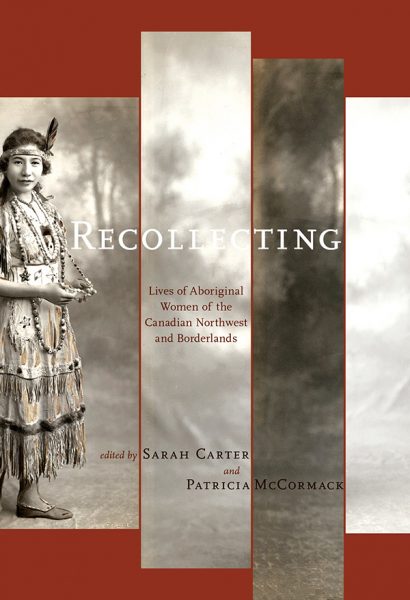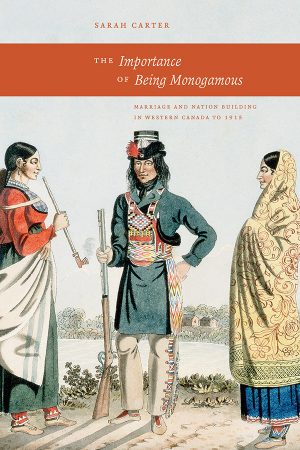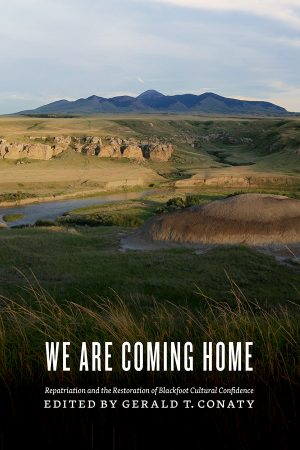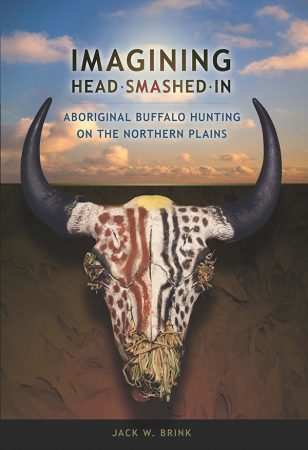Subjects: Canadian History, Cultural Studies, History, Indigenous Studies
Series: The West Unbound: Social and Cultural Studies
Imprint: AU Press
- 9781897425824 (paperback)
- 9781897425831 (pdf)
- 9781926836324 (epub)
This rich collection of essays illuminates the lives of late-eighteenth-century to mid-twentieth-century Aboriginal women, women who have been overlooked in sweeping narratives of the history of the West.
Some essays focus on individuals—a trader, a performer, a non-human woman. Other essays examine cohorts of women—wives, midwives, seamstresses, nuns. Authors look beyond the documentary record and standard representations of women, drawing on records generated by the women themselves, including their beadwork, other material culture, and oral histories. Exploring the constraints and boundaries these women encountered, the authors engage with difficult and important questions of gender, race, and identity. Collectively these essays demonstrate the complexity of “contact zone” interactions, and they enrich and challenge dominant narratives about histories of the Canadian Northwest.
As we continue to learn from the Delgamuukw v. British Columbia land-claim case–in which an orally recited, ancient, and sacred indigenous genre of lineage history was, in effect, put on trial, dismissed as insubstantial and inferior to written records, but eventually admitted, in 1997, as acceptable evidence in a Canadian court—there are many constructions of 'history' in Native societies, all likely to be contested, and all requiring nuanced understanding of context for interpretation. Comprehending these contexts holistically…requires an inclusive vision in order to see the intimate linkages among community oral traditions, written expressions of personal experience, forms of material culture that communicate memories intergenerationally, and their relationships to conventional documentary sources. The detailed, innovative, and transdisciplinary approaches represented in Recollecting give historians some valuable examples of how to conduct research across the many borderlands of the Aboriginal past and in the process give voice to those long silenced—something oral historians do so well.
Robert E. Walls, University of Notre Dame
Awards
- 2011, Winner, Armitage-Jameson Prize, Western History Association and the Coalition for Western Women’s History
- 2012, Winner, Best Scholarly and Academic Book, Book Publishers Association of Alberta
- 2012, Winner, Willa Literary Award, Scholarly Nonfiction, Women Writing the West
- 2012, Winner, Best Book in Aboriginal History Prize, Canadian Historical Association.
Reviews
Sarah Carter and Patricia McCormack unsettle the dominant, white-settler narrative of Canadian history while also contributing in a unique way to the genre of women’s historical biography.
Prairie Forum
An exciting new collection that spans over 200 years of Canadian history…. The central themes are primarily the negotiation of fluid identities within a changing and dynamic context and the importance of looking beyond the archive to recover what, the authors argue, lies beyond the colonizing gaze. […] Recollecting provides a thoroughly readable trove of information and includes some useful illustrations of many of the individuals and of some of the handiwork under discussion. The well-researched articles as a whole, remind us as researchers to seek diligently to capture voices present in objects, in stories, and in recollections not found in any traditional textual archive.
The Canadian Historical Review
This collection’s introduction and twelve articles can quite rightly be seen as one grand recovery mission, a giant step toward increasing dramatically the complexity of western/colonial history through the lives of Aboriginal women.
Western Historical Quarterly
The fact that the best essays rely not on journals or books written by women (which would thus make them elite and somewhat unusual) but on varied sources that discuss them or that they left behind, such as dictated reminiscences, makes these articles more thought-provoking and impressive. Even when the book focuses on more famous representatives, such as Catherine Auger, Frances Nickawa, or Anahareo, the essays present them as multidimensional figures who changed over time and embraced and rejected cultural norms.
Montana, The Magazine of Western History
More than emphasizing an active role for Aboriginal women in history, Atkinson, Barman, and their fellow contributors offer highly readable biographies showcasing hybridity, resiliency, contradictory historical experiences, and, above all, the diversity of Aboriginal women’s identities.
BC Studies
Table of Contents
- List of Illustrations
- Acknowledgments
- Lifelines: Searching for Aboriginal Women of the Northwest and Borderlands / Sarah Carter and Patricia A. McCormack
- PART ONE: Transatlantic Connections
- 1. Recovered Identities: Four Métis Artists in Nineteenth-Century Rupert’s Land / Susan Berry
- 2. Lost Women: Native Wives in Orkney and Lewis / Patricia A. McCormack
- 2. Christina Massan’s Beadwork and the Recovery of a Fur Trade Family History / Alison K. Brown, with Christina Massan & Alison Grant
- PART TWO: Cultural Mediators
- 4. Repositioning the Missionary: Sara Riel, the Grey Nuns, and Aboriginal Women in Catholic Missions of the Northwest / Lesley Erickson
- 5. The “Accomplished” Odille Quintal Morison: Tsimshian Cultural Intermediary of Metlakatla, British Columbia / Maureen L. Atkinson
- 6. Obscured Obstetrics: Indigenous Midwives in Western Canada / Kristin Burnett
- PART THREE: In the Borderlands
- 7. Sophie Morigeau: Free Trader, Free Woman / Jean Barman
- 8. The Montana Memories of Emma Minesinger: Windows on the Family, Work, and Boundary Culture of a Borderlands Woman / Sarah Carter
- PART FOUR: The Spirit World
- 9. Searching for Catherine Auger: The Forgotten Wife of the Wîhtikôw (Windigo) / Nathan D. Carlson
- 10. Pakwâciskwew: A Reacquaintance with Wilderness Woman / Susan Elaine Gray
- PART FIVE: Challenging and Crafting Representations
- 11. Frances Nickawa: “A Gifted Interpreter of the Poetry of Her Race” / Jennifer S.H. Brown
- 12. Blazing Her Own Trail: Anahareo’s Rejection of Euro-Canadian Stereotypes / Kristin L. Gleeson
- Notes / Contributors / Index
This work is licensed under a Creative Commons License (CC BY-NC-ND 2.5 CA). It may be reproduced for non-commercial purposes, provided that the original author is credited.



![[book cover] Visiting with the Ancestors](https://www.aupress.ca/app/uploads/120249_Visiting-with-the-Ancestors-cover-474x450.jpg)
